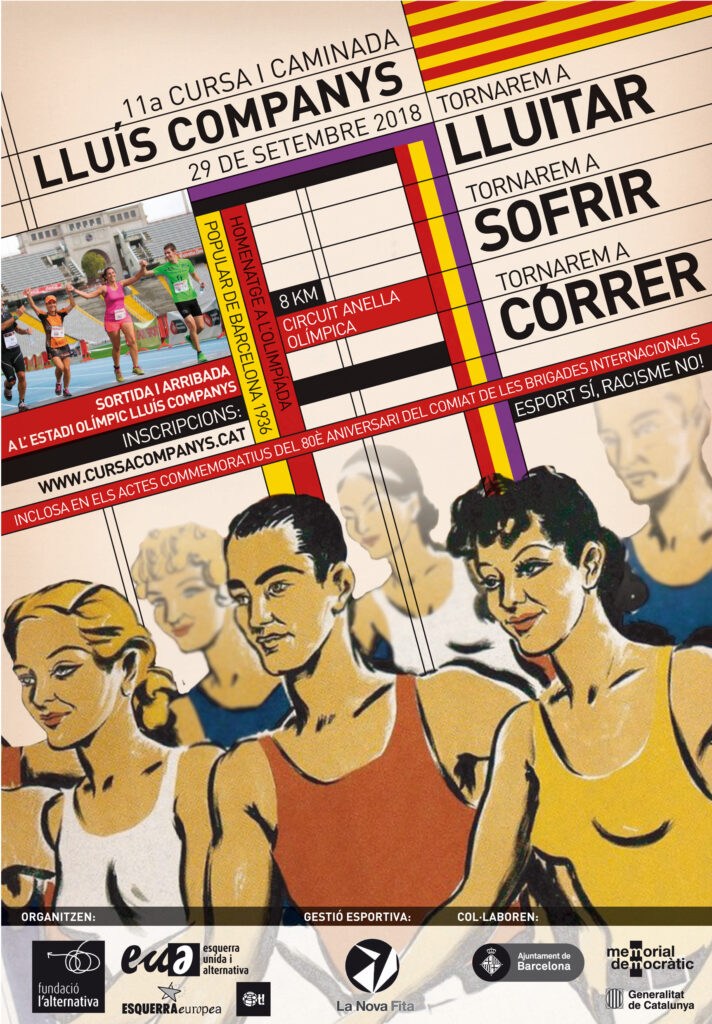Transform!’s catalan member organization fundació l’alternativa is organising annually the Iluis Companys race in commemoration of the anniversary of the farewell of the international brigades and the 1936 people’s olympiade.
Background
In 1936, Barcelona was one of the candidate cities for hosting the 1936 Olympic Games. However, on April 14th, 1931, eleven days before the International Olympic Committee (IOC) decisive meeting, the Catalan capital proclaimed the 2nd Republic. Finally, the aristocratic ones of the IOC preferred to decide for the conservative Berlin (43 votes) and not for the Republican and progressive Barcelona (16 votes).
Two years later, the Nazis took power in Germany (in 1933) and Hitler saw the Berlin Olympic Games as an excellent propaganda opportunity for his regime.
The idea of running the People’s Games
In Spain, the elections held in February 1936 were won by the Popular Front in Madrid, and the Front of the Left (Front d’Esquerres) in Catalonia.
In March 1936, the Catalan Pro People’s Sport Committee (CCEP_ Comitè Català pro Esport Popular_ according to the acronym in Catalan) was created with the aim of improving a massive sporting event, making sports accessible to everyone.
In April 1936, the CCEP had the idea of organizing an international people’s games as an alternative to the fascist Berlin Olympic Games.

Throughout three months, just between May and July, hundreds of international contacts were made, the program of the event was drafted, and all the infrastructures were organized. The previous was possible thanks to the popular sports and social associations in Catalonia, the workers’ committees and to a thousand of volunteers. The cost of the People’s Olympiad was covered by the French left-wing government (600,000 francs), the Spanish government (400,000 pesetas) and the Government of Catalonia (100,000 pesetas).
In spite of most countries decided to attend to Berlin, the organizers of the Barcelona’s Olympiad managed to register more than 6,000 athletes in a record time. As a comparison, 1,429 athletes from 40 countries took part in the Los Angeles Olympic Games held in 1932, and 4,106 athletes from 49 countries attended the Berlin Games held in 1936.
The People’s Olympiad should have had to last only four days, from July 22nd to 26th. However, it had to be extended to a whole week by the large number of registrations. The competitions were scheduled in 19 sports disciplines (In the 1932 Los Angeles Olympic Games, there were only 14 disciplines; and 22 in the 1936 Berlin Games).
The main venue would have been the Montjuïc Olympic Stadium, but other games were held at other facilities in the city.
In total, athletes from 23 nationalities registered: Sweden, Switzerland, Hungary, Palestine, Morocco, Norway, England, Belgium, Canada, United States, France, Greece, Portugal, Holland, Algeria, Denmark, the former Czechoslovakia, Alsace, Spain, Euskadi, Galician and Catalonia. Almost half of the athletes belonged to the delegations from Spain, Euskadi, Galician and Catalonia. A Jewish exile delegation registered, too. The largest international delegation was from France, with 1,500 athletes.
One of the more significant features was the high presence of females sport practitioners, a higher number than in Berlin. So, it was the fact that elite sportspeople (European champions and Olympic athletes) competed side by side with amateurs without experience in high-level events. For the organizers, this was the ideal which represented the sport for everyone.
In addition, a very wide cultural offering was scheduled, which included activities in most of the city’s theaters, clubs and cultural associations.
A broken dream
The opening ceremony was planned for July 19th in the Montjuïc Olympic Stadium; and the People’s Olympiad official anthem, composed by Josep Maria de Sagarra, was played with Pau Casals as the orchestra conductor. More than 5,000 athletes and 3,000 folk dancers would parade and the opening speech would be given by the President of the Catalan Government, Lluís Companys.
On the afternoon of July 18th, all the athletes paraded all along through the Barcelona Ramblas and the rehearsals were run in the Stadium, However, in the dawn, they were awakened by the sound of gunfire. The People’s Olympiad had ended: the Civil War had started. Some athletes returned to their homelands, but many others stayed to fight against fascism. They all gathered in the first international brigade.
The Race And Walk Lluis Companys
The preserving of the Historic Memory is one of the main Fundació l’Alternativa projects.
The race Lluís Companys of 8Km-long started in 2007, with the participation of 500 athletes, and it is a tribute to the People’s Olympiad held in Barcelona, but also to the unique president killed by the fascism.
The race is “accompanied” by a popular walk, too.
This year, the Fundació l’Alternativa is member of the commission which organizes several events to celebrate the anniversary 80th of the farewell of the International Brigades. Also, Edouard Amoureux, president of the Commission and Amical de les Brigades Internacional, will make a briefly statement to illustrate the historical and antifascist importance of the commemoration of both the Race and the Walk.
For further information in this link: www.cursacompanys.cat
Members of the Clarion Cycling Club participated in the celebration of the 80th anniversary, and by this reason, this year we propose the participation of people involved in the antifascist struggle in Europe (so be it in the race, the walk, or handling the trophies). This solicitude is for having a response to these times that xenophobic and right-wing movements are becoming increasingly influential in Europe and the human rights of the refugees and immigrants are being systematically desecrated by European Union member states.
FUNDACIÓ L’ALTERNATIVA
E-mail: info@fundacioalternativa.com
